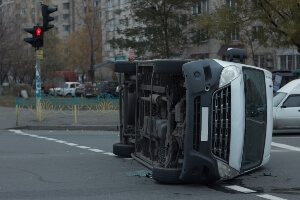Blog
Rollover Crashes in MD: How They Happen and Who May Be Liable
Posted on behalf of Peter T. Nicholl in Car Accidents Published on November 18, 2024 and updated on November 19, 2024. Rollover crashes account for a small percentage of all collisions in Maryland, but many of these collisions result in catastrophic injuries or fatalities.
Rollover crashes account for a small percentage of all collisions in Maryland, but many of these collisions result in catastrophic injuries or fatalities.
This blog discusses the causes of rollover crashes, how to prevent them and who may be liable for the resulting damages.
Injured in a rollover crash caused by another’s negligence? Our knowledgeable Maryland Car Crash Attorneys are ready to help you recover the compensation you deserve. At The Law Offices at Peter T. Nicholl, you can get answers to your legal questions in a free, no-risk consultation.
Request your FREE case review today. 410-297-0271
What Is a Rollover Crash and Why Are They So Dangerous?
A rollover crash occurs when a vehicle tips onto its side or roof, often rotating multiple times before coming to rest. These violent accidents typically happen when a vehicle’s center of gravity becomes destabilized during sudden turns, collisions, or after striking roadside objects like guardrails or curbs.
While any vehicle can roll over under extreme circumstances, SUVs, pickup trucks, and vans are particularly vulnerable due to their higher center of gravity. According to federal safety data, rollover crashes have a significantly higher fatality rate than other types of accidents, as the roof may crush inward, and occupants may be ejected if not properly restrained.
Who May Be Liable for a Rollover Crash?
In most rollover crashes, the driver who loses control of their vehicle bears primary responsibility for the accident. However, Maryland law recognizes that multiple parties may share liability, and a thorough investigation often reveals additional factors and responsible parties that weren’t immediately apparent.
Potentially liable parties can include:
- The driver of the rolled vehicle, especially in single-vehicle accidents involving speed or distraction
- Other drivers whose dangerous actions forced sudden evasive maneuvers
- Vehicle manufacturers if design flaws or defective components contributed to instability
- Government entities responsible for hazardous road conditions or poor highway maintenance
- Cargo loading companies if improper weight distribution affected vehicle stability
- Tire manufacturers if sudden tire failure triggered the rollover
- Parts manufacturers if defective safety systems failed to prevent the crash
- Commercial trucking companies if their driver’s negligence caused your vehicle to roll
What Are the Most Common Causes of Rollover Crashes?
Rollover crashes in Maryland often result from a complex combination of factors, including driver behavior, vehicle characteristics, and environmental conditions. Understanding these common causes can help drivers recognize and avoid potentially dangerous situations that could lead to a rollover.
- Excessive Speed: Taking curves or corners too quickly can destabilize a vehicle’s center of gravity
- Sudden Steering Maneuvers – Abrupt swerving to avoid obstacles or other vehicles can trigger a roll
- Vehicle Type: Taller vehicles like SUVs and trucks have a higher center of gravity, making them more prone to rollovers
- Tire Failure: Sudden blowouts or tread separation can cause drivers to lose control and roll
- Poor Road Conditions: Slippery surfaces, uneven pavement, or steep shoulders increase rollover risk
- Distracted Driving: Late recognition of hazards often leads to panic maneuvers that can cause rollovers
- Impaired Driving: Alcohol and drugs significantly impair judgment and reaction time
- Overloaded Vehicles: Improper loading or excessive cargo weight can make vehicles top-heavy and unstable
How Can I Prevent a Rollover Crash?
Preventing rollover crashes starts with understanding your vehicle’s handling characteristics and practicing safe driving habits. If you drive an SUV, pickup truck, or van, for instance, you need to be especially mindful of your vehicle’s higher center of gravity and adjust your driving accordingly.
Avoid distractions, stay alert and scan the road ahead for potential hazards that might require sudden maneuvers. Maintain safe speeds, especially when taking curves and during adverse weather conditions. Keep your tires properly inflated, follow your vehicle’s load capacity guidelines, and ensure cargo is evenly distributed.
Never drive while impaired by alcohol, drugs or fatigue, as these factors significantly increase your risk of losing control and rolling your vehicle.
Wearing seatbelts is another safety measure drivers and passengers can take. If a rollover car crash happens, it could reduce the severity of injuries.
Need Legal Help After Being Injured in a Maryland Car Crash? We Can Help
If you were injured in a rollover accident, you may be eligible to recover significant compensation for your medical costs, lost wages and other damages.
At Peter T. Nicholl, we are here to protect your rights and fight for the compensation you deserve. Contact us today to discuss your case with a qualified attorney at our firm. There are no upfront costs or fees to hire our services.
Contact our trusted law firm today: 410-297-0271.

